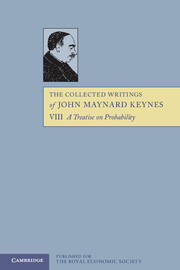Book contents
- Frontmatter
- Contents
- General Introduction
- Editorial Foreword by R. B. Braithwaite
- Editorial Note
- Preface to the First Edition
- I FUNDAMENTAL IDEAS
- II FUNDAMENTAL THEOREMS
- III INDUCTION AND ANALOGY
- IV SOME PHILOSOPHICAL APPLICATIONS OF PROBABILITY
- 24 THE MEANINGS OF OBJECTIVE CHANCE, AND OF RANDOMNESS
- 25 SOME PROBLEMS ARISING OUT OF THE DISCUSSION OF CHANCE
- 26 THE APPLICATION OF PROBABILITY TO CONDUCT
- V THE FOUNDATIONS OF STATISTICAL INFERENCE
- Bibliography
- Index
24 - THE MEANINGS OF OBJECTIVE CHANCE, AND OF RANDOMNESS
from IV - SOME PHILOSOPHICAL APPLICATIONS OF PROBABILITY
Published online by Cambridge University Press: 05 November 2012
- Frontmatter
- Contents
- General Introduction
- Editorial Foreword by R. B. Braithwaite
- Editorial Note
- Preface to the First Edition
- I FUNDAMENTAL IDEAS
- II FUNDAMENTAL THEOREMS
- III INDUCTION AND ANALOGY
- IV SOME PHILOSOPHICAL APPLICATIONS OF PROBABILITY
- 24 THE MEANINGS OF OBJECTIVE CHANCE, AND OF RANDOMNESS
- 25 SOME PROBLEMS ARISING OUT OF THE DISCUSSION OF CHANCE
- 26 THE APPLICATION OF PROBABILITY TO CONDUCT
- V THE FOUNDATIONS OF STATISTICAL INFERENCE
- Bibliography
- Index
Summary
1. Many important differences of opinion in the treatment of probability have been due to confusion or vagueness as to what is meant by randomness and by objective chance, as distinguished from what, for the purposes of this chapter, may be termed subjective probability. It is agreed that there is a sort of probability which depends upon knowledge and ignorance, and is relative, in some manner, to the mind of the subject; but it is supposed that there is also a more objective probability which is not thus dependent, or less completely so, though precisely what this conception stands for is not plain. The relation of randomness to the other concepts is also obscure. The problem of clearing up these distinctions is of importance if we are to criticise certain schools of opinion intelligently, as well as to the treatment of the foundations of statistical inference which is to be attempted in Part V.
There are at least three distinct issues to be kept apart. There is the antithesis between knowledge and ignorance, between events, that is to say, which we have some reason to expect, and events which we have no reason to expect, which gives rise to the theory of subjective probability and subjective chance; and, connected with this, the distinction between ‘random’ selection and ‘biassed’ selection. There are next objective probability and objective chance, which are as yet obscure, but which are commonly held to arise out of the antithesis between ‘cause’ and ‘chance’, between events, that is to say, which are causally connected and events which are not causally connected.
- Type
- Chapter
- Information
- The Collected Writings of John Maynard Keynes , pp. 311 - 323Publisher: Royal Economic SocietyPrint publication year: 1978



